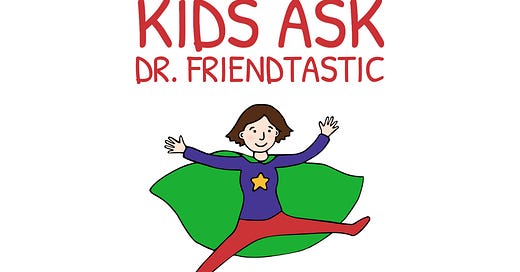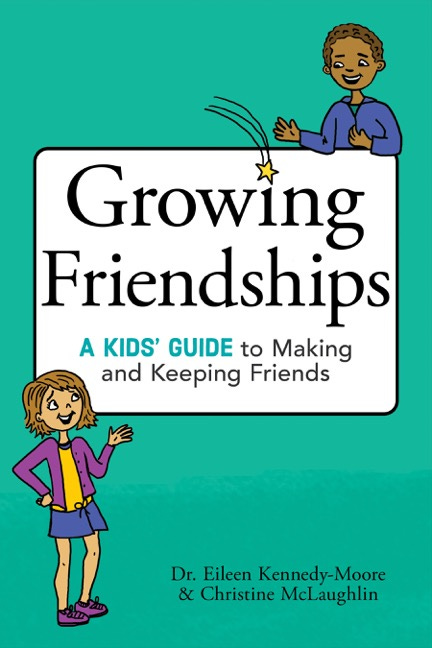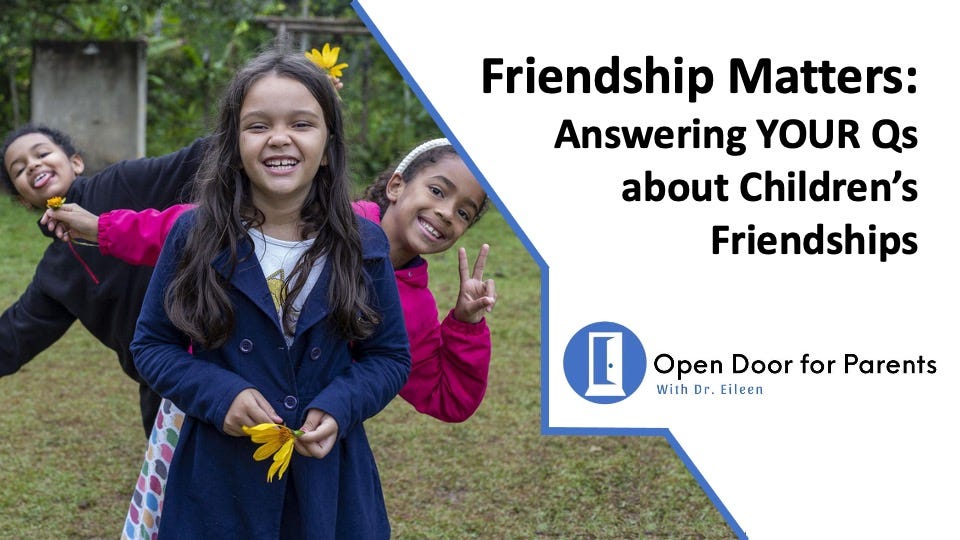(Would you rather read? A TRANSCRIPT is at the bottom of this post.)
Abby wonders why kids tease other kids. Are they just doing it for attention or are there more reasons?
Scroll down for some DISCUSSION QUESTIONS you can share with your child plus how to submit your child’s question.
Unlock the power of friendship!
Become a free subscriber to get the Kids Ask Dr. Friendtastic podcast episodes, transcripts, and discussion questions sent directly to your email.
Join now as a paid subscriber to access the tools you need to support your child's feelings and friendships. In addition to podcast episodes, you’ll get posts for parents, access to the full archive, the option to submit parent questions for the newsletter, PLUS invitations to paid-subscriber-only webinar events..
Please help the podcast grow!
I can’t do it alone. If you love the Kids Ask Dr. Friendtastic podcast, please help it continue and grow by sending in your child’s question about friendship and by asking your friends to submit their children’s questions. Here are the instructions:
Adults, please use your smartphone's memo function or an audio app to record your child's question. Hold the phone close to your child's mouth to make sure the recording is clear. Have your child state:
1) their FIRST NAME (or another name),
2) their AGE, and
3) a BRIEF QUESTION or concern about friendship. (Please do not include any friends' names.)
Email the audio file to DrF@EileenKennedyMoore.com. I’ll answer as many questions as I can. (Obviously, this is not psychotherapy, and it’s not for emergency situations.)
Think About It Questions to discuss with your child
Do you have strong feelings about bananas? Why or why not? (OK, that question doesn’t have anything to do with friendship, but it’s fun to think about!)
What are some reasons why kids tease?
Can you think of a time that someone teased you in a friendly way? How could you tell it was friendly rather than mean teasing?
Have you ever been the target of mean teasing? What happened? How did you respond?
Have you ever teased someone in what you thought was a fun and friendly way but the other kid got upset? What happened? Why do you think that kid was bothered by what you said? What did you do to help the other kid feel better?
Why is it important to tell a friend if their teasing bothers you? What could happen to your friendship if you don’t say anything about that?
Dr. Friendtastic gave lots of examples of neutral or boring responses to teasing. Why might those work better than yelling at the teaser? Which of those comments would you feel comfortable saying if you were teased?
Go Deeper!
Want to learn more about how you can support your child’s feelings and friendships? My books and webinars–for parents and kids–give you in-depth understanding and practical, research-based ideas you can use immediately.
Featured Book
Growing Friendships: A Kids’ Guide to Making and Keeping Friends
By Eileen Kennedy-Moore, PhD, and Christine McLaughlin (Beyond Words/Aladdin)
for ages 6-12
A funny and useful guide to help children navigate the social world. Filled with cartoons and research-based tips.
“The secret playbook you’ll wish you’d had when you were growing up.”
— Diane Debrovner, executive editor, Parents magazine
BUY IT NOW on Amazon or wherever you buy books.
Featured Webinar
Friendships Matter: Answering YOUR Questions about Children’s Friendships (60 min.)
In this online conversation hour, Dr. Eileen delves into the most pressing questions from parents about kids and friendships. This informal Q&A session covers a wide range of topics from how to deepen casual friendships to recognizing when others feel left out. It also explores the delicate balance between meanness and bullying, and it provides you with practical tips on how to handle teasing that goes too far.
Transcript
Welcome! I’m Dr. Eileen Kennedy-Moore, also known as Dr. Friendtastic. I’m an author and clinical psychologist based in Princeton, NJ.
Here’s today’s question:
I’m Abby. I am 9. My question is, why do people tease you for attention?
Hi, Abby! That’s a very interesting question. Almost every kid has been teased, and it can be upsetting. You might feel angry, embarrassed, hurt, or sad.
Teasing involves a combination of humor and aggression. The person getting teased may not find if funny, but the teaser almost always claims that they’re just trying to be funny.
There are lots of different kinds of teasing. Someone might take something of yours and hold it out of your reach. Or they might make fun of how you look or tell an embarrassing story about something you did. They might trash talk you during a sports game or call you names or imitate you in an exaggerated way. They might even tease you with noises, like saying, “Nyah Nyah!”
You mentioned teasing for attention. Often kids tease because they’re looking for a reaction from the person being teased. They may feel powerful or find it entertaining if the kid being teased gets upset.
Teasers might also be trying to impress others. They might think that if they point out someone else’s differences or difficulties, it makes them look better. That’s not true. You can’t lift yourself up by putting others down.
Sometimes kids join in on teasing because they want to be part of a group and distance themselves from the kid being teased–sort of like announcing, “I’m nothing like that kid!”
Sometimes teasers are mad about something but don’t want to say it directly, so they lash out indirectly, through teasing. That’s not a good way to solve problems!
But sometimes teasing is a friendly sign of affection and playfulness. So, how can you tell the difference between friendly and unfriendly teasing?
The most important clue is your relationship with the teaser. If you usually get along well, it’s probably friendly teasing. If you don’t, it’s more likely mean teasing.
How they tease matters. Does the teaser have a friendly smile or a mean smirk? Is their tone of voice silly or sarcastic?
The topic of the teasing also matters. For instance, if a friend calls you something like “Hannah Banana,” well, that doesn’t really say anything about you as a person, and you probably don’t have strong feelings about bananas, so that’s likely just goofing around. But if someone teases you about a more personal or sensitive topic, and especially if they do that in front of others, that’s more likely mean teasing.
So, that brings us to another question: How should you respond to teasing?
Well, if you’re friends with the teaser, but you don’t like the teasing, say so! You could say, “Please don’t call me that. I don’t like it.” or “That’s an uncomfortable topic for me. Could you please not tease me about it?” Good friends care about each others’ feelings, but they can’t read each other’s minds. You may need to tell your friend directly if their teasing bothers you.
If the teasing is friendly and silly, you could respond with silliness or just say a classic line like “I know you are but what am?” or “That’s so funny I forgot to laugh.” Be careful that you don’t respond with mean teasing to a friend who’s just being silly.
But what about unfriendly teasing? Showing how upset you are or talking about how hurt you feel could give an unfriendly teaser the reaction they’re looking for. Trying to be mean back will definitely make the situation worse.
Sometimes ignoring works, but often that just makes the teaser try harder to get a reaction.
You may want to try giving a bored response then calmly walking away. You could say, “So what?” or “OK” or “Tell me when you get to the funny part.” Bored agreement with the teasing can be a conversation ender. “Yep, that’s true. I’m bad a free throws.” You could also pretend it’s a compliment and say, “Thanks for noticing!” with a big, fake smile.
Then don’t hang around to listen or argue! You don’t respect the unfriendly teaser’s opinion, so walk away like it doesn’t matter.
If the teasing is very hurtful, and it continues even after you’ve tried giving a bored response and walking away a few times, or if it’s a group of kids picking on you, you may want to talk privately with a grown-up who can help.
This has been Kids Ask Dr. Friendtastic. If you have a question about making and keeping friends that you’d like me to answer, go to DrFriendtastic.com, and click on the podcast tab to see how to submit your question.
And be sure to check out my books for kids about friendship: Growing Friendships: A Kids’ Guide to Making and Keeping Friends, and my new book, Growing Feelings: A Kids’ Guide to Dealing with Emotions About Friends and Other Kids. They’re available through your library or wherever you buy books.













Share this post